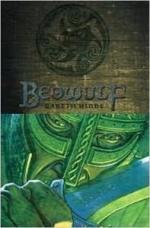The
men of the Weders made accordingly
A
hill on the height, high and extensive,
Of
sea-going sailors to be seen from a distance,
And
the brave one’s beacon built where the fire was,
25 In ten-days’
space, with a wall surrounded it,
As
wisest of world-folk could most worthily plan it.
They
placed in the barrow rings and jewels,
[107]
{Rings and gems are laid in the barrow.}
All
such ornaments as erst in the treasure
War-mooded
men had won in possession:
30 The earnings
of earlmen to earth they entrusted,
The
gold to the dust, where yet it remaineth
As
useless to mortals as in foregoing eras.
’Round
the dead-mound rode then the doughty-in-battle,
Bairns
of all twelve of the chiefs of the people,
{They mourn for their lord, and sing his praises.}
35 More
would they mourn, lament for their ruler,
Speak
in measure, mention him with pleasure,
Weighed
his worth, and his warlike achievements
Mightily
commended, as ’tis meet one praise his
Liegelord
in words and love him in spirit,
40 When
forth from his body he fares to destruction.
So
lamented mourning the men of the Geats,
Fond-loving
vassals, the fall of their lord,
{An ideal king.}
Said
he was kindest of kings under heaven,
Gentlest
of men, most winning of manner,
45 Friendliest
to folk-troops and fondest of honor.
[109]
ADDENDA.
Several discrepancies and other oversights have been noticed in the H.-So. glossary. Of these a good part were avoided by Harrison and Sharp, the American editors of Beowulf, in their last edition, 1888. The rest will, I hope, be noticed in their fourth edition. As, however, this book may fall into the hands of some who have no copy of the American edition, it seems best to notice all the principal oversights of the German editors.
From ham (194).—Notes and glossary conflict; the latter not having been altered to suit the conclusions accepted in the former.
Þaer gelyfan sceal dryhtnes dome (440).—Under ‘dom’ H. says ’the might of the Lord’; while under ‘gelyfan’ he says ‘the judgment of the Lord.’
Eal bencþelu (486).—Under ‘benc-þelu’ H. says nom. plu.; while under ‘eal’ he says nom. sing.
Heatho-raemas (519).—Under ‘aetberan’ H. translates ‘to the Heathoremes’; while under ‘Heatho-raemas’ he says ’Heathoraemas reaches Breca in the swimming-match with Beowulf.’ Harrison and Sharp (3d edition, 1888) avoid the discrepancy.
Fah feond-scaetha (554).—Under ‘feond-scaetha’ H. says ’a gleaming sea-monster’; under ‘fah’ he says ‘hostile.’




